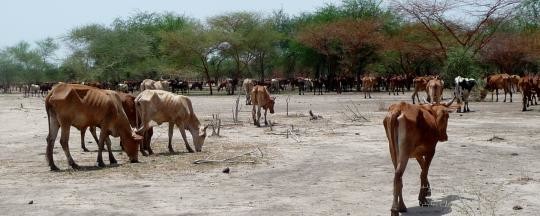Cattle keepers in Sudan’s Sennar state on the border with South Sudan’s Upper Nile state expressed their concern on Wednesday that ‘more than 6 million cattle’ are at risk due to lack of pasture land, following a border closure between the two countries.
Speaking to Radio Tamazuj on Wednesday, a number of cattle keepers expressed their worry regarding access to grazing land and drinking water, explaining that what was available from seasonal pools has dried up and that purchasing water for livestock is too expensive.
They continued to explain that the water they currently purchase is transported by donkey and the quantity required to sustain a goat costs 300 pounds per week.
The affordability of livestock vaccination costs was another issue of concern, costing 60 pounds per animal rather than the previous price of 12 pounds.
Given this situation, the pastoralists predicted that if no agreements on grazing can been reached with the South Sudanese authorities this month, their livestock may perish. Those Radio Tamazuj spoke to called upon local authorities to initiate an agreement as soon as possible.
Yusuf Aburouf, Rafaayin tribal leader and MP from the region claimed that the solution lies with the nomadic leaders along the border and recommended that they ask the government of South Sudan to grant them access to pasture land.
The border between Sennar state and Upper Nile has been closed since conflict between the two nations over the disputed oil-rich area of Heglig. Both sides agreed to demilitarize a contested border area known as ‘Mile 14’ in September in order to create a buffer zone but neither side has yet begun to implement this.




